Oct
2
2010

The content of this post has been revised and included in Bible Matrix II: The Covenant Key.
___________________________________________
[1] See Behold Your Mother.
[2] See Incantation or Incarnation.
[3] Ray R. Sutton, That You May Prosper, pp. 73-75. Forget Calvin. Forget Barth. This book is a must-read.
[4] See Little Man With No Hair and Veiled Lawlessness.
Comments Off | tags: Covenant curse, Covenant Theology, Postmillennialism, Ray Sutton, Tabernacles, Zechariah | posted in Bible Matrix, Biblical Theology, Ethics, Quotes
Aug
23
2010
Psalm 114 – Family of Blood
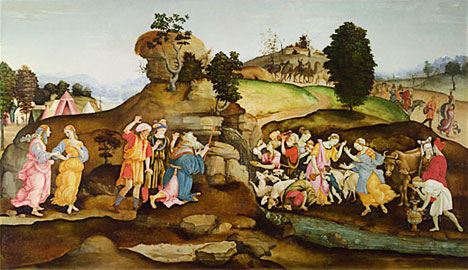
Psalm 114 is one of those weird passages of Scripture that makes you wonder if the author was high on something. Without an understanding of the significance of the place of this song among these seven Psalms, the lyrics appear to be either the overly-clever, sophomoric crypticism of an ancient Bono or the fragmented derivatory prattlings of a madman.
Continue reading
4 comments | tags: Babel, Egypt, Literary Structure, Numbers, Peter Leithart, Psalms, Zechariah | posted in Bible Matrix, Biblical Theology
Aug
14
2010

“Do you suppose that I came to give peace on earth? I tell you, not at all, but rather division.” Luke 12:51
Another weird idea James Jordan presents in his Revelation lectures is the premise that the famous Four Horsemen of the Apocalypse represent the gospel. As Uri Brito wrote a couple of years ago, first you think Jordan is nuts; then, as you continue to study, you think he is less nuts. Finally you give in and accept his genius, because his premise is vindicated by the similar use of the symbols in the Old Testament, and the literary structure of the event.
Continue reading
Comments Off | tags: AD70, Balaam, Herod, John, Literary Structure, Numbers, Revelation, Systematic typology, Zechariah | posted in Bible Matrix, Biblical Theology, The Last Days, The Restoration Era
Aug
2
2010
or The Art of Noise
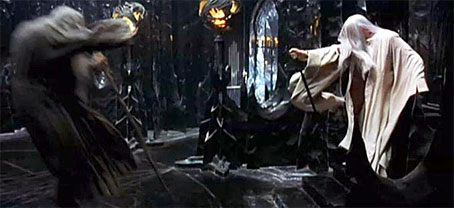
Must be wizards week!
For the word of God is living and powerful, and sharper than any two-edged sword, piercing even to the division of soul and spirit, and of joints and marrow, and is a discerner of the thoughts and intents of the heart. (NKJV) Hebrews 4:12
But someone will say, “You have faith, and I have works.” Show me your faith without your works, and I will show you my faith by my works. (NKJV) James 2:18
The firmament was a veil to hide God’s throne from Man until he was ready to see God face to face. Of course, we see types of this throughout the Bible, Job, Jacob and Moses being notable examples. But no man had seen God until after Christ ascended and was presented as Facebread.
Your face is a veil of flesh that hides your brain, the source of your intentions. Your head is a microcosm of the Tabernacle at one level, and your entire body at another. You are a Garden and a Land.
Deceivers mask their true intentions with facial expressions and body language. Good spies can even pass a lie detector test. Between their true intentions and the flesh that is supposed to be communicating it, there is a deliberate disconnect. As in the Garden, it is the mind of a beast speaking with the eyes and mouth of a man.
Continue reading
Comments Off | tags: AD70, Cain, Doug Wilson, Martyrdom, Oswald Chambers, Psalms, Tabernacle, Veil, Worship, Zechariah | posted in Bible Matrix, Biblical Theology, The Last Days
Jul
8
2010
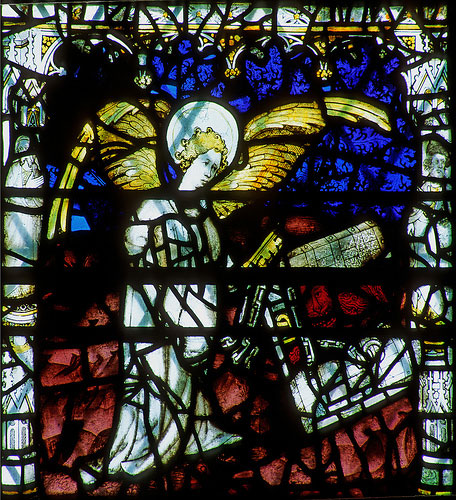 Revelation 20 describes the binding of Satan and his exile to the abyss. He was bound so Christ can spoil his “vessels.” He was sent to the place of legless creeping things. He was put under a lid, and will stay there until the final judgment, when he will be released for a short time, so he can be exposed and destroyed. [1]
Revelation 20 describes the binding of Satan and his exile to the abyss. He was bound so Christ can spoil his “vessels.” He was sent to the place of legless creeping things. He was put under a lid, and will stay there until the final judgment, when he will be released for a short time, so he can be exposed and destroyed. [1]
Continue reading
7 comments | tags: Millennium, Revelation 20, Satan, Zechariah | posted in Against Hyperpreterism, Biblical Theology, The Last Days, The Restoration Era
Jun
2
2010
or Disputatio with God
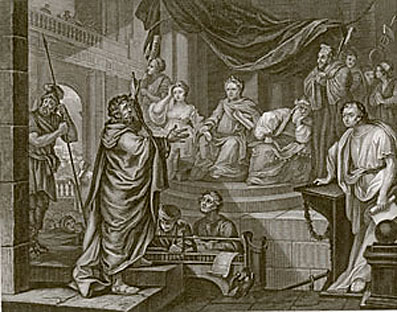
Re The Wrath of Love, Michael Micklow commented:
(Correction – not Michael Shover – Michael got his Michael’s crossed)
“The prophet did not have to remind God, so much as he had to remind himself of the love of God, and to see God’s judgment as the wrath of love.”
What about the dangerous yet successful Mosaic paradigm in Exodus 32:7-14? In this section, the prophet is able to approach, contest and sway God’s wrath (vv. 11-13). In response to Moses’ challenge, the text tells us, “and the Lord changed his mind about the disaster that he planned to bring on his people” (v. 14)…
… And what was the cornerstone of his defense? — the appeal to memory (v. 13). Moses cites the exodus event, and he further appeals to the covenant established with Abraham.
Continue reading
Comments Off | tags: Ascension, David, Habakkuk, Intercession, James Jordan, Maturity, Memorial, Moses, Psalms, Satan, Zechariah | posted in Apologetics, Biblical Theology
Jun
1
2010

I said, “You are gods, and all of you are children of the Most High. But you shall die like men, and fall like one of the princes.” Psalm 82:6
As discussed elsewhere here, the five-point Covenant model as it gets played out in history becomes seven-point. The central “Ethics” gets split into three: Law-Testing-Law.
Moses, the Covenant head, ascends and receives the Law. He opens it for Israel as Mediator. Israel, as body, is tested under the Law. The Law is given again to a “resurrected” Israel, the next generation.
In microcosm, we see this in the incident with the golden calf. Moses is given the Tablets, Israel is tested, and the Tablets are broken. Moses brings the Law a second time.
In macrocosm, the Law is given from Sinai, Israel is tested for forty years, and Moses brings the Law again in Deuteronomy to a “resurrected” Israel, the next generation.
Continue reading
Comments Off | tags: Exodus, John, Moses, Pentecost, Peter Leithart, Vindication, Zechariah | posted in Against Hyperpreterism, Biblical Theology, Quotes, The Last Days
Apr
25
2010
 Great stuff from Peter Leithart’s blog:
Great stuff from Peter Leithart’s blog:
Michael Stead (The Intertextuality of Zechariah 1-8 (Library of Hebrew Bible/Old Testament Studies)) points to a number of intertexual connections between Ezekiel 1-11 and the vision of Zechariah 5:5-11. He concludes that the vision of Zechariah is an inversion of the Ezekiel’s vision of Yahweh’s departing glory: “Ezekiel 1-11 describes the departure of Yahweh from Jerusalem because of the idolatry (Ezek 8), iniquity (Ezek 4) and wickedness (Ezek 5) of his people, and his departure is attended by winged creatures riding on the wind. But, now that Yahweh is returning to dwell in Jerusalem, idolatry/iniquity/wickedness is being forced to depart, in a parody of Yahweh’s earlier departure.”
Continue reading
1 comment | tags: Ark of the Covenant, Ezekiel, Peter Leithart, Resurrection, Zechariah | posted in Biblical Theology, Quotes, The Restoration Era
Mar
15
2010
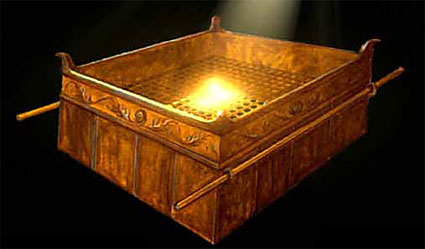
Okay, so The Earth is Flat after all. The Atlar’s being a symbol of the mediatorial Land, (a priesthood between the heavenly sky and Gentile sea) is the key to a fair amount of weird stuff in the Bible. It also means that a lot of what goes on in the Torah is the key to understanding some later enigmatic events.
The Bronze Altar had a grate inside it to support the sacrifice. The ashes would fall through the holes in the grate and the smoke would rise as a pleasing aroma to God.
In Numbers 16, concerning the rebellion of Korah and his sons, after the “censer” showdown between them and Aaron, the ground opened up and swallowed their tents, all their belongings and their families. However, fire consumed the wannabe priests who were offering the “false” incense. Even the rebellion was divided according to the priestly divisions within Israel. Ashes and smoke. [1]
Continue reading
Comments Off | tags: Aaron, Crucifixion, Korah, Liturgy, Revelation, Tabernacle, Zechariah | posted in Biblical Theology, The Last Days
Jan
26
2010
31. The remnant of Israel still practices iniquity (Zeph. 3: 13).
Drew was right. Some of these really are weak. Zephaniah denounces Judah for her indulgence in idolatry and luxury while she presumed the Lord would protect her. He predicts a new Jerusalem without these sins. All fulfilled. Ripping the prophets out of context and applying them to modern “Jews” is not only infantile exegesis, it removes most of the Bible from the real world so it can apply to some future Jews. God doesn’t work that way. He warns, waits a generation, then judges. Always. Same thing goes for the Revelation.
Continue reading
Comments Off | tags: AD70, Feasts, Literary Structure, Zechariah | posted in Biblical Theology, The Last Days


































